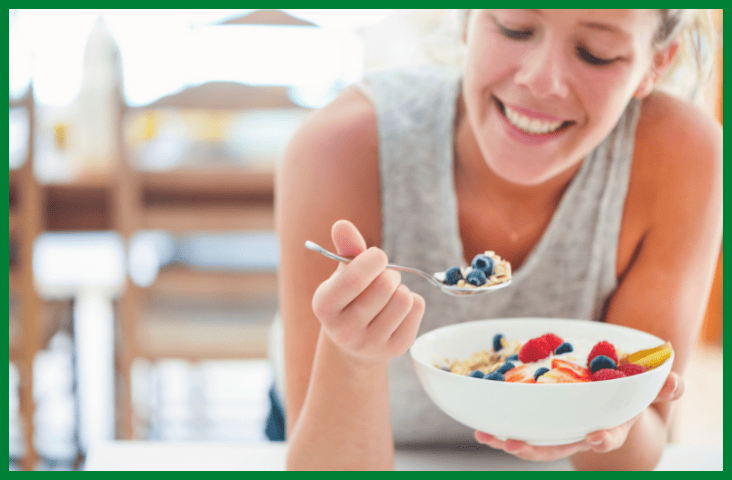
Healthy Family Food: Don’t forget the grownups
Up in the morning, children dressed, mum and dad dressed, little ones fed, lunches made, bags packed and out the door. Is this a typical morning routine in your house? It may also involve coffee and possibly a little nagging or grumbling. Notice anything missing? No breakfast for Mum or Dad. While it may be other parts of a healthy lifestyle, rather than breakfast, how many of us are guilty of looking after our children’s health but neglecting our own?
This month’s blog is taking a different approach to the usual, and focussing on mums, dads and carers. At Mother Duck, we appreciate that healthy children start with healthy families. And as a working Mum, I also know how easy it is for our own eating habits to suffer when we are busy. I’ve had a particularly busy few months, so my ideas here are based on my first-hand experience of what tends to slide when the going gets tough.
Breakfast – We’d all like to sit down to a luxurious breakfast every day, but this is rush hour in most houses with children. That said, there’s a wealth of research pointing to the benefits of eating breakfast, from providing vital nutrients to improving work performance. People who start the day with empty fuel tanks may have more difficulty coping with stressful situations (whether in family or work environments). Short-term memory and alertness levels may also suffer, as can energy levels. Actually, the effects are just what we would expect from our children if they’ve missed a meal. Definitely not the best start to the day!
If finding time to fit in the first meal of the day is a problem, you could try to eat while making school lunches, or make your own breakfast sandwich to eat while dressing or on the road. If you are a super-organised person who does kids’ lunchboxes the night before, maybe take the time to make yourself an on-the-go breakfast. Other ideas include:
- Having a milk-based coffee – not the ideal choice but at least it has some protein and carbs to provide a bit of fuel for your morning
- Grabbing a banana as you head out the door
- Keeping muesli bars (look for lower fat and sugar ones) in the car
- Having a stash of rice cakes or crackerbread (preferably wholegrain ones) and low-fat cream cheese at work.
A friend of mine boils an egg while making school lunches and eats it, squished into a slice of bread, while she gets herself ready to go out the door. Foods high in protein, such as eggs, tend to keep us fuller for longer, and she finds this breakfast-on-the-run keeps her going for hours.
Snack wisely – Despite our best intentions to skip snacks, some of us just don’t function well once we’re a few hours past our last meal. If you’re one of those people who get mid-morning or mid-afternoon hunger pangs, try to have something nutritious with you. This could be a low-fat, low-sugar yogurt in the fridge at work, a piece of fruit, or half a wholegrain bagel with a smear of light cream cheese and jam. If not, you may find yourself so hungry you reach for biscuits or chips instead. And skipping an afternoon snack can lead to excessive pre-dinner nibbling – in my case this often includes scoffing children’s dinner leftovers. Definitely not what I need just before my own dinner!
There’s another benefit to snacking regularly if you are one of those people whose bodies demand it. Keeping blood sugar levels on an even keel can help to keep our moods and energy levels stable too, which is very helpful when dealing with small children after a long day.
Lunch – Like snacks, lunches away from home are all about planning. If you don’t have a healthy option with you, or easy access to a range of nutritious foods, it’s easy to grab the fastest option. Often this is less healthy, and not what you’d choose if you had more time. The costs also add up.
If you’re preparing lunches for childcare or school, why not take another couple of minutes to make an extra one for yourself and any other adults going out to work? This may carry the bonus of focussing extra attention on kids’ lunches as well. Here are a few ideas that may work for grown-ups and their little ones:
- Use leftover rice or pasta to make a salad, maybe adding in cherry tomatoes, cucumber and feta cheese cubes
- Cook an extra piece of chicken with dinner so you can make a chicken salad or sandwich without needing to buy more processed meats such as ham.
- Pop in a pot of hummus or tzatziki with carrot and capsicum spears
- An old-fashioned meat and salad roll, with the added zing some nice relish or mustard for the grown-ups.
Go for convenience – Making our own food from scratch is ideal. It means we know exactly what’s gone into it and how it’s been cooked. However there’s no doubt that this can take longer and that it can be hard to find the time. Healthy convenience food such as frozen veg and precooked rice and other grains can take a few minutes off the preparation time for meals and may mean the difference between a (mostly) home-cooked meal and resorting to a take-away or ready meal. Here are a few convenience foods to keep in the cupboard or freezer to help make mealtimes easier:
- A range of frozen vegetables, including whatever sorts your children enjoy
- Frozen fruit for smoothies or for when you run short on fresh fruit
- Fruit tinned in juice and lower-salt tinned vegetables
- Pre-cooked rice, quinoa and other grains
- Cans and sachets of precooked lentils, beans and chickpeas
- Pizza bases – and keeping a bottle of pasta sauce in the cupboard and grated mozzarella in the freezer means you can whip up home-made pizza in a jiffy, with whatever plant-based proteins, meat and vegetables you have around.
- Ready-to-eat noodles and stir-fry sauces – again you can use whatever plant-based proteins, meat and veg you have around, including the frozen veg. Just go easy on the amount of sauce because they do tend to be high in salt.
Your waistline and your wallet will thank you!
Healthy hydration – It’s easy to become a little dehydrated when you’re in a rush. Try to drink enough water to quench your thirst, to avoid the temptation to reach for sugary drinks instead. There’s an added danger with being a little thirsty – some people’s bodies tend to confuse thirst for hunger and this leads them to reach for extra snacks instead. And staying hydrated has an added bonus: it helps to avoid the tiredness and grumpiness that can accompany the early stages of dehydration, often before we even realise we are thirsty.
While these are strategies designed to help the health of mums, dads and carers, it may bring a long-term benefit to your children too. Seeing parents looking after their bodies – drinking water and eating fruit, for instance – will set a good example that may help children along the path to good health. This applies especially to our younger ones, who are not yet under so much influence from peer group pressure and hopefully not too much advertising – parents and carers are still their main influence for healthy (and unhealthy) eating.
It’s typical for loving parents and carers to put themselves and their health second to their children. I hope these ideas will help to keep all members of your families fighting fit.
For more trustworthy information on adult nutrition, take a look at these websites:
- https://www.eatforhealth.gov.au/guidelines/australian-dietary-guidelines-1-5
- https://www.heartfoundation.org.au/bundles/healthy-living-and-eating/healthy-eating
© Fiona Hinton 2023
MEDICAL DISCLAIMER: Please note that this blog is for general information only, and should not be taken as a substitute for qualified medical advice. Please discuss medical issues with your child’s doctor before taking any action.
About Fiona: Fiona Hinton is a dietitian, but describes herself as a nutrition translator, taking the science of nutrition and translating it into foods we love to eat, to nourish both body and soul. She has over 20 years of experience as a dietitian, working in a wide range of areas from hospital wards to running her own private practice. Fiona has a special interest in children’s nutrition. As a mum of three school-age boys, she has first-hand experience of the issues associated with feeding young children, such as weaning and fussiness. Fiona specialises in real-life strategies and practical suggestions to convert nutrition advice into food kids will eat. Fiona has collaborated on several books, including one with best-selling children’s food writer Annabel Karmel, as well as training childcare staff in children’s nutrition.






